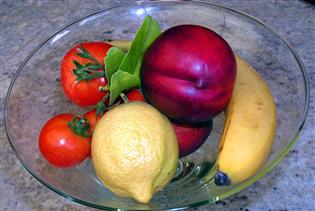Vitamins for Cancer? Part 2
January 6, 2014 | Author: Susan Silberstein PhD
As discussed in part one of this article, nutritional synergy from whole foods is much more effective than just vitamins for cancer. For example, high tomato consumption has been linked to reduced risk for prostate cancer, breast cancer, lung cancer and stomach cancer. Tomatoes do contain vitamin A, vitamin C and vitamin E, but it is the many other bioactive components in tomatoes like antioxidant polyphenols and carotenoids (especially lycopene) that are responsible for the contribution of tomatoes to cancer prevention and control.
In one prostate cancer study conducted at the Karmanos Cancer Institute, researchers gave men already diagnosed with cancer either a placebo or a lycopene-rich whole-food tomato supplement for three weeks. After surgery, when the scientists studied the cancerous tissue, they found smaller, less aggressive tumors in the lycopene group as compared with controls.
Apples, another anti cancer food, contain vitamin A, B, C, E and K, but scientists from Cornell University and Seoul National University found that other natural phytochemicals from apples work even better than its vitamins. These include antioxidant flavonoids, polyphenols, and quercetin. In other research, Cornell scientists found that triterpenoids in apple skin can help protect against colon cancer, breast cancer and liver cancer., , ,
According to nutritionist Dr. Judith DeCava, consuming whole foods like fruits and vegetables is more beneficial in decreasing risk of cancer and other chronic diseases than consuming isolated supplements because of “the additive and synergistic effects of their plant chemical content.”
Research demonstrates that whole foods help prevent cancer or reverse disease in ways that fractionated supplements are unable to perform. The body knows the difference.
Join the conversation: Ask Holistic Cancer Coach Facebook Group
References:
[1] Kucuk O, Sarkar FH, Djuric Z, et al. Effects of lycopene supplementation in patients with localized prostate cancer. Exp Biol Med (Maywood). 2002
Nov;227(10):881-5.
[2] www.sciencedaily.com/releases/2002/01/020123075403.htm. How vitamin C prevents cancer – but apples are better. Science Daily Jan. 24, 2002, Geneva,
NY
[3] Lee CY, Lee KW, Lee HJ et al.The Lancet, Jan. 12, 2002 (Vol. 359, No. 9301)
[4] www.telegraph.co.uk/health/healthadvice/maxpemberton/8899641/An-apple-or-a-few-vitamin-pills-a-day.html
[5] He X and Liu RH. Triterpenoids isolated from apple peels may be partially responsible for apples’ anticancer activity. Journal of Agricultural
and Food Chemistry 55(11) June 2007
[6] DeCava J. The whole food and nothing but the food. Immune Perspectives 2007 XI(2) [Adapted with permission from Nutrition News and Views, May/June
2006]
